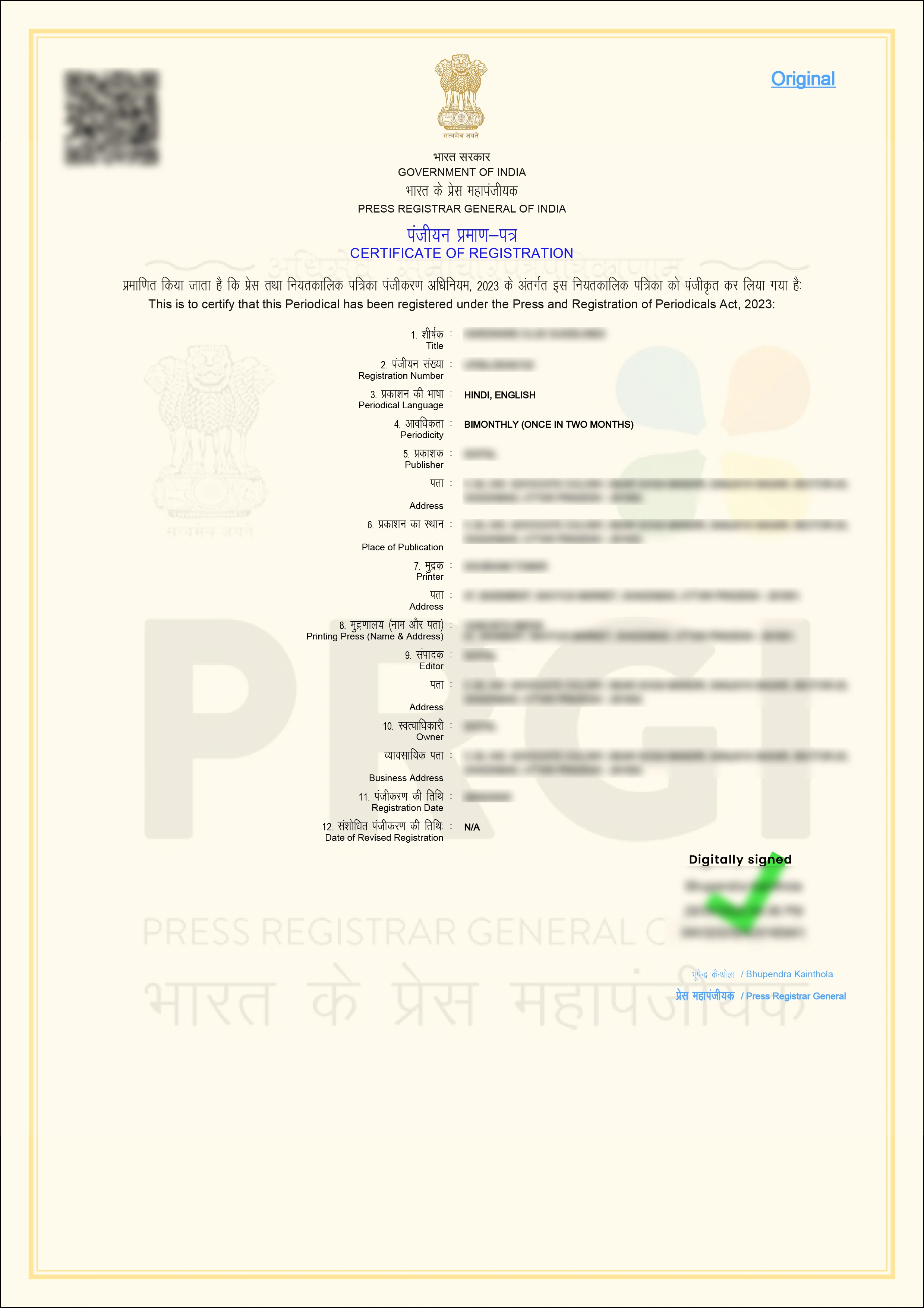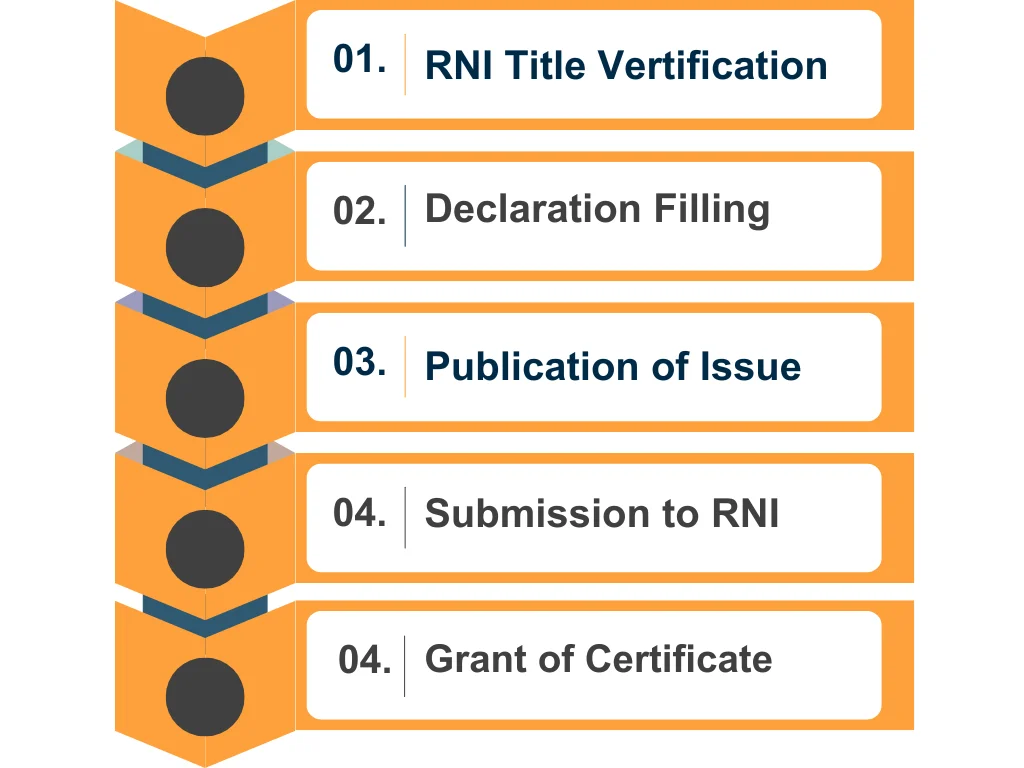
Get Instant Solution By an Expert Advisor
(4.8)
In India, the RNI: Registrar of Newspapers of India issued a Certificate of Registration to the companies of newspapers, magazines, journals, articles, & printed publications. All publishing industries come under the Press and Book Registration Act of 1867. Agile Regulatory, with a team of experienced professionals, offers a complete package for RNI registration. Reach out to our experts to find a specific solution to your unique requirements.


10000 +
Projects Completed for Our Respected Clients.
15 +
Years Experienced Advisors in Indian Compliance.
98.9%
Project Delivery Ratio for Our Valuable Clients.
99.9%
Satisfied Customers All Over India.
RNI Registration, now officially managed by the Press Registrar General of India (PRGI), is the mandatory legal process a publisher must complete to legally publish any newspaper or periodical in India, securing a unique title, ensuring legal compliance under the new Press and Registration of Periodicals (PRP) Act 2023, and providing official recognition needed for postal concessions and government advertisements.
RNI or PRGI certification moves you from an aspiring writer to a legally recognized media entity, ensuring your title is protected and your publication is acknowledged by the Government of India. You must complete RNI Registration process online to start printing legally
RNI registration is the process of registering a newspaper, magazine, or periodical with the Registrar of Newspapers for India, an official body under the Ministry of Information and Broadcasting. Established in 1956 under the Press and Registration of Books Act (PRB Act), 1867, RNI is responsible for maintaining a record of all newspapers and periodicals published in India.


To apply for RNI and obtain registration for a periodical in India under the new PRGI system, you must satisfy certain basic, clear criteria.:
The publisher must be either an Indian citizen or a legal entity like a company, firm, or trust that is incorporated and registered in India under the existing laws. Foreign entities can only bring out a facsimile edition of a foreign periodical with prior approval from the Central Government.
The individual owner and publisher must be of legal age and sound mind. The Act specifically prohibits any person who has been convicted by any court for an offense involving a terrorist act, unlawful activity, or an offense against the security of the State from bringing out a periodical. This rule is very strict.
Any foreign newspaper corporation or entity wishing to publish their newspaper in India must acquire RNI registration before the commencement of business.
You absolutely need to apply if you intend to publish any:
You do not need RNI/PRGI registration if your publication falls into these categories:
Once a title has been approved, no other publication can use the same title.
RNI registration applies to a wide range of periodic printed publications, which are mentioned below. Publications must be printed at regular intervals and contain news, information, opinions, advertisements, or entertainment content.
The application is entirely online via the Press Sewa Portal. You must have these documents ready for a smooth process
The entire process is now streamlined and paperless through the official Press Sewa Portal

The applicant must start with online title verification for the proposed newspaper or publication. This is the first and most important step toward legally registering your publication with the Registrar of Newspapers for India (RNI or PRGI). The title must be unique.
1. Visit RNI Online Registration Portal:
2. Click on “Title Verification” under the ‘Registration’ tab.
3. Fill in the online application form (Form I) with:
4. Submit the application form for approval.
Processing Time: Around 2-3 weeks.
The Owner invites the designated Publisher and the Printer to sign up on the portal. The Printer (owner/keeper of the printing press) must furnish an online intimation about the press details.
The Publisher, with the Owner's authorization, fills out the main Registration Form online. The application is simultaneously sent to the PRGI and the Specified Authority (District Magistrate) in the publication's local jurisdiction.
The publisher must pay the prescribed Registration Fee online.
The Specified Authority verifies the Publisher's/Printer's declaration and details. Once the PRGI receives a favorable report from the Specified Authority, and all compliance is met, the PRGI issues the Certificate of Registration digitally through the portal
The government fee for the registration process is minimal
You can easily check the registration status of any publication, or your own, using the official PRGI tools. You should visit the Press Sewa Portal or the PRGI official website.
Look for the 'Verify Periodical Details' or similar section under the online services menu. You can search by the Registration Number (if you have it) or by the Publication Name, Language and State.
The system will display the current legal status the date of registration and other key details about the periodical
RNI Title Verification is the process of verifying the title of a publication with the Registrar of Newspapers for India, also known as RNI. This is an essential step for an applicant looking to start a new newspaper, magazine, or periodical in India.
Title verification ensures that the proposed title is unique and not already registered with the RNI in order to avoid a common name or any other legal issues.
In order to achieve RNI registration, it is obligatory to complete the title verification process, which involves the following steps:

To initiate the process, the applicant needs to access the official online portal
The applicant should carefully read the instructions available on the website and check for any updates regarding the title verification process. Click on the 'online title application' tab.
Before proceeding with the application for title verification, the applicant must thoroughly review all provided details to prevent potential issues in securing the title.
Complete publication details should be provided by the applicant, including mandatory information. A valid mobile number and email address are essential elements to include.
The application for title verification must be submitted to the relevant authorities, such as DCP in Delhi, who manage RNI registration matters.
The authority will forward the application to RNI, including their name, signature, and seal. RNI will assess the application upon receiving the hard copy. Processing begins only after the hard copy reaches RNI. Applicants are advised to retain a signed hard copy for future reference.
Once the hard copy reaches RNI, they will review it and assign an RNI reference number. This reference number will be sent to the applicant's registered mobile number and email address.
Applicants can check the application status or rni title verification status online by using the DM number or RNI reference number.
In the final step, the applicant can download the title verification letter. The title will either be accepted upon meeting requirements or rejected if criteria are not met.
After successfully obtaining registration your annual compliance duty is to file the Annual Statement digitally. The statement requires crucial details like:
Getting your publication registered with the PRGI provides major advantages.
The PRGI performs several statutory and non-statutory functions under the new PRP Act, 2023.
After obtaining registration, the inaugural edition of the newspaper should include a properly completed Form No. IV, which will serve as a declaration containing information about the ownership and other particulars of the newspaper. Furthermore, another essential requirement includes the submission of the annual statement using Form II, which must be done by the final day of May each year.
If you're making any changes to your publication, you must submit a change declaration to the district magistrate and inform RNI with the mandatory documents, such as:
Below mentioned are the few common errors that result in the rejection of RNI applications. To avoid delays, always ensure documents are complete, accurate, and submitted on time.
The new PRP Act, 2023, completely replaces the outdated 1867 law, making the entire registration process fully online through the Press Sewa Portal.
This modern Act focuses only on periodicals—which includes newspapers, magazines, and other print media published at regular intervals containing public news or comments on public news.
A crucial change is that the new Act removes books and journals of scientific, technical, or academic nature from the registration requirement, simplifying things greatly.
Obtaining the RNI Certificate for printing press, newspaper, magazine, and article publication could be a bit challenging due to the complex process of the documents required and the processes involved. However, with the right amount of guidance and consultation, you could easily acquire an RNI Certificate within the prescribed time. At Agile Regulatory, we are committed to helping budding entrepreneurs by enabling them to acquire business licenses smoothly and carry on their business.

Get Instant Solution By an Expert Advisor
(4.8)
Indeed, it is feasible to ascertain name availability. The status could be assessed by examining a substring of the word or syllables instead of the entire name.
Yes, once the title is approved, the RNI registration process must be completed within two years following title verification.
Once it is ensured that the concerned publication issue includes the title as well as relevant information in such one or more languages, the titles & publication could be published.
Indeed, at the time of declaration, the applicant has the option to omit or exclude specific languages. The publisher's responsibility is to ensure that the newspaper is solely published in the language specified during the declaration.
No, changing the location of a verified title is not feasible. To explore this possibility, the applicant needs to submit a fresh application for title declaration.
Yes, the RNI registration could be transferred from one entity to the other after the applicant has legally been issued the RNI registration.
The following timeframes must be adhered to for releasing publication or newspaper issues:
Yes, separate declarations are required in cases where the publishers & printers are separate entities.
If the first issue cannot be published within 42 days, a declaration must be submitted to the district magistrate explaining the situation
RNI stands for Registrar of Newspapers for India (RNI), an office under the Ministry of Information and Broadcasting established by Section 19 of the Press & Registration of Books Act, 1867.
The Registrar of Newspapers for India administers newspaper registration across the Indian region.
According to the updated RNI Title Registration Guidelines, effective from January 1/ 2021, owners/publishers must register their title within 1 year from the date of title verification.
Applying for RNI registration is straightforward. Simply visit [www.rni.nic.in], where you can submit your application by uploading the required documents, including personal details, PAN, TAN, and affidavits.
Proven 4-step Process: Consultation, Documentation, Submission, and Certification.
Startups to large enterprises, we deliver end-to-end solutions business compliance needs.

What our customer says about us
Fantastic support from the team. Their expertise transformed our approach, driving remarkable outcomes. A must-have partner for businesses seeking effective consulting solutions. Highly recommended.

Lavkush Sharma
KTPL Instruments
Agile Regualtory delivers exceptional solutions. Their insightful guidance streamlined our processes and boosted profitability. Highly recommended for businesses seeking expert consulting services to thrive.

Nitin Mukesh
Justrack IOT
Impressed by Agile Regulatory's expertise. Their strategic insights and practical solutions have elevated our business operations. A reliable partner for effective consulting services. Highly recommended for growth-focused businesses.

Pradeep Varma
Coaire Compressor
Extraordinary consulting services. Their insightful solutions and dedicated team reshaped our business, driving remarkable improvements. Highly recommend it for transformative results.

Bharat Bachwani
Easy Polymer
Incredible experience with Agile Regulatory. Their innovative strategies and expert advice revitalized our business model, resulting in impressive growth. Highly recommend their exceptional consulting services.

Atul Jain
Tarus International
Top-tier consulting! offered strategic solutions that revolutionized our approach. Their deep expertise and personalized guidance made a significant impact on our success. Highly recommend their services.

Paramjeet Singh
Anchor Weighing
Agile Regulatory exceeded expectations! Their tailored solutions, expertise, and proactive approach led to remarkable results. Highly recommend for businesses seeking impactful and strategic guidance.

Anshul Rathi
AM Capacitor
Outstanding service! delivered targeted solutions with professionalism and expertise. Their insights elevated our business strategies, resulting in noticeable growth. Highly recommended for exceptional consultation.

Shekhar Maurya
Imaxx Pro Aquistic